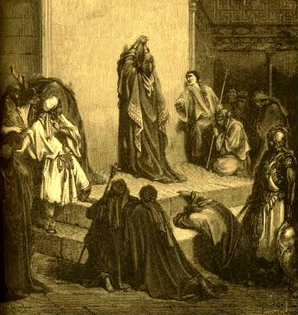 by Fr. Patrick Henry Reardon
by Fr. Patrick Henry Reardon
Although the Israelites venerated Abraham and Isaac as their forefathers, they derived their specific lineage from Jacob. It was from Jacob’s new name, Israel, that the Israelites received their designation as a people (Genesis 32:28).
The story of Jacob is a special point in Salvation History; we may think of it, perhaps, as a pivotal point, in the sense that the line of the biblical narrative swings in a new direction when it comes to Jacob. He serves as the active hinge between the accounts of the patriarchs and the history of the Chosen People.
This function of Jacob as the hinge in biblical history is indicated, of course, in the broad structure of the narrative, but it should not surprise us to find it, as well, in certain thematic features of a less obvious sort.
In this respect, I believe the story of Jacob bears comparison with the two other biblical accounts, one of them from the earlier period and the other from specifically Israelite history; I propose to compare Jacob with both Abel and David.
A first thing we observe is that all three are shepherds. Abel, in fact, is history’s first shepherd. The pastoral idea seems to have been his own. Abel’s father was an agriculturalist, who tilled a cursed earth in the sweat of his brow (3:17-19), and evidently the elder brother, Cain, carried on that tradition (4:2). Abel, however, observing that the whole family wore animal skins (3:21), gave the matter some thought and came up with the idea of raising flocks. God had not given any directions about such a project, but evidently He approved of it, because
“the Lord respected Abel and his offering” (4:4).
Jacob, for his part, took the pasturing project in a new direction by experiments in genetic selection; these were highly successful (30:25-43). As for David, his own experience tending sheep (1 Samuel 17:15) served chiefly to prepare him to shepherd God’s People, Israel (Psalms 78 [77]:70).
A second feature of similarity among these three men is both darker and dramatic: an association with fratricide. In the case of the first shepherd, we know that jealousy prompted the occasion on which
“it came to pass, when they were in the field, that Cain rose up against Abel his brother and killed him” (Genesis 4:8).
In Jacob’s case, fratricide did not actually happen, but only because he had the sense to flee the murderous wrath of Esau (27:41-42).
His escape, nonetheless, did not remove the specter of fratricidal rage from the life of Jacob. Indeed, his own sons plotted to murder their younger brother. Of Joseph and his brethren Genesis tells us,
“Now when they saw him afar off, even before he came near them, they conspired against him to kill him. Then they said to one another, ‘Behold, this dreamer is coming! Come therefore, let us now kill him and cast him into some pit; and we shall say, “Some wild beast has devoured him.” We shall see what will become of his dreams!'” (37:18-20).
Although Joseph’s life was ultimately spared (like Jacob’s own), Jacob did suffer his loss, when the older brothers concocted a story of his violent death (37:35).
As in the case of Jacob, the story of David introduces the theme of fratricide among his sons. With respect to David there are, in fact, two instances of fratricide. The first is Absalom’s murder of Amnon. Indeed, the Bible places this murder in the setting of a sheep-shearing festival (2 Samuel 13:23-29). The second fratricide in David’s family is Solomon’s execution of Adonijah (1 Kings 2:23-25).
With both Jacob and David, there is also a similar mourning over the loss of their sons. Of the first we are told,
“Then Jacob tore his clothes, put sackcloth on his waist, and mourned for his son many days. . . . He refused to be comforted, and he said, ‘For I shall go down into the grave to my son in mourning'”(Genesis 37:34-35).
And at the death of Absalom, Holy Scripture says,
“So the victory that day was turned into mourning for all the people. For the people heard it said that day, ‘The king is grieved for his son.’ . . . But the king covered his face, and the king cried out with a loud voice, ‘O my son Absalom! O Absalom, my son, my son!'”(2 Samuel 19:2-3).
At the pivotal point, then, between two periods of biblical history, the career of Jacob conveys the same sense of tragedy we find in the dark, dramatic stories of Abel and David in the earlier and later parts of the Bible.
